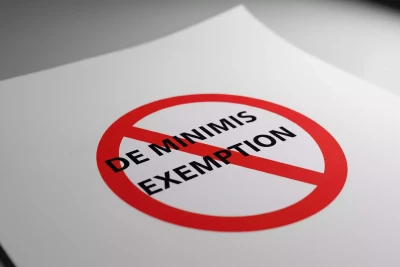Trump Administration Ends De Minimis Exemption: What It Means for the Supply Chain
September 23, 2025
 The Trump administration has announced the end of the long-standing de minimis exemption, a trade policy that allowed low-value imports to enter the United States without being subject to duties or taxes. This significant policy shift is set to have far-reaching consequences across the supply chain, from international shippers and freight forwarders to domestic retailers and consumers.
The Trump administration has announced the end of the long-standing de minimis exemption, a trade policy that allowed low-value imports to enter the United States without being subject to duties or taxes. This significant policy shift is set to have far-reaching consequences across the supply chain, from international shippers and freight forwarders to domestic retailers and consumers.
While this policy had been in effect for imports from China since May of 2025, recent adjustments have ended the exemption for all imports.
Also known as Section 321, the de minimis exemption has been a critical component of international trade for decades. It permitted goods valued under a certain threshold—formerly $800 per shipment—to enter the U.S. without incurring customs duties or taxes. The policy streamlined cross-border e-commerce and small-package imports, reducing paperwork and costs for companies and speeding delivery times for consumers.
By eliminating this exemption, the administration aims to tighten trade enforcement, increase revenue from customs duties, and level the playing field for U.S. manufacturers who have long argued that the policy gave foreign competitors an unfair advantage.
Ending the de minimis exemption will ripple through the entire supply chain. Here are just a few potential consequences of the policy.
Higher Costs for Importers: Companies that rely on low-value international shipments will face new duties and tariffs, increasing landed costs. Small and medium-sized e-commerce sellers, especially those sourcing from overseas marketplaces, will feel the impact most sharply.
Increased Customs Workload: Customs brokers and freight forwarders will need to process a far greater volume of formal entries, adding administrative complexity and potential delays at ports of entry.
Pressure on Logistics Providers: Parcel carriers and logistics providers will need to adapt to higher documentation requirements and possibly slower clearance times, which could disrupt established delivery schedules.
Price Adjustments for Consumers: With import costs rising, businesses may pass these expenses on to consumers in the form of higher retail prices.
To mitigate disruption, supply chain stakeholders should begin planning immediately. Companies may consider reshoring or nearshoring production to reduce reliance on low-value international shipments. Importers should work closely with customs brokers to streamline documentation and explore tariff classification strategies to minimize costs, while adjusting inventory levels to account for potential delays in customs clearance can help maintain service levels. Finally, retailers and e-commerce platforms should proactively explain potential price changes or delivery delays to maintain customer trust.
While the Trump administration’s decision to end the de minimis exemption is intended to strengthen U.S. trade policy and domestic manufacturing, it introduces significant challenges for global supply chains. Companies that adapt quickly through strategic sourcing, improved customs processes, and transparent customer communication will be best positioned to weather the change and maintain competitiveness in a rapidly evolving trade landscape.
For businesses seeking reliable logistics support during this transition, offers the expertise and resources needed to keep shipments moving smoothly despite new regulatory hurdles. Contact us today to learn more about our full-service 3PL solutions.














